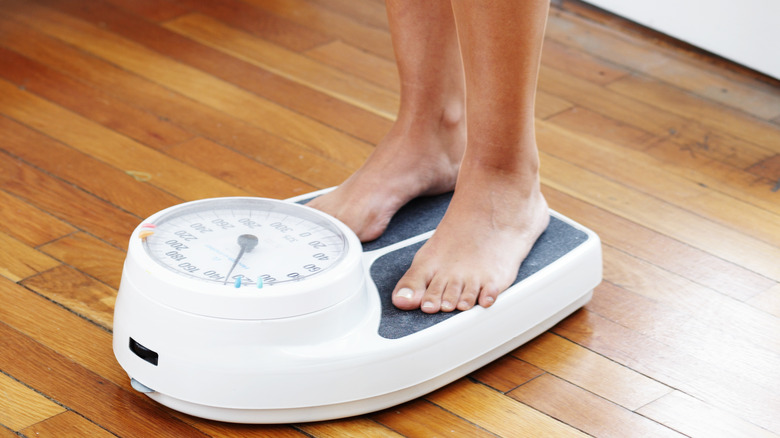What Happens To Your Body When You Stop Eating Sugar
Sugar is much maligned, but it's not all bad — in moderation. The fact is that most people eat way more sugar than they should. Health experts recommend that men shouldn't have more than 9 teaspoons per day, and women should limit their daily intake to 6 teaspoons. However, the average American eats a whopping 17 teaspoons of sugar a day.
Sugar offers no nutritional value, but it does provide 4 calories per gram. There are about 272 calories in 17 teaspoons, which is more than 10% of the calories the average person needs in a day. The problem with too much sugar is that it either crowds out healthy foods or is consumed in addition to other foods, putting you over your calorie balance. Sugar has other harmful effects as well. It raises blood pressure, erodes teeth, inhibits glycemic control, causes inflammation, and much more. Excess sugar intake has been linked with a host of chronic health conditions, including cancer and heart disease.
Some people decide to go cold turkey, kicking the sugar habit altogether. That's challenging to do, and it won't work for everyone. But even reducing your sugar intake can offer benefits. When you curb your sugar intake, you'll also curb your risk of serious disease and see some other welcome changes in your body.
Weight loss
Although weight loss is more complicated than just reducing calories, lowering your energy intake is an important part of the strategy. Extra calories you consume that your body doesn't immediately need for energy are stored as fat. Over time, your body stores more and more fat, leading to weight gain, overweight, and obesity. Sugar contributes calories but no nutrition. Eating a lot of sugar doesn't provide any satiation; it doesn't satisfy your appetite, so you just keep eating more and more. That's why sugar calories are called "empty" calories.
You'd be surprised at just how many empty calories are in your favorite sugary drinks and snacks. A 12-ounce can of cola has almost 40 grams of sugar. That's 10 teaspoons, or a bit over 150 calories. A 2-ounce candy bar has about 26 grams of sugar, and a chocolate cupcake with icing has 29 grams. Cutting these foods out of your diet can shave quite a bit off your daily intake.
But it's not just the excess calories that contribute to weight gain. Systemic inflammation, poor glycemic control, increased fatigue, poor sleep, low mood, and many other things can also affect how much weight you gain and how easy or hard it is to lose.
Lower risk of type 2 diabetes
Type 2 diabetes is a condition in which your body doesn't have enough of or doesn't use insulin, a hormone that regulates blood glucose levels, correctly. It's often a combination of the two. The relationship between sugar consumption and type 2 diabetes is still unclear. It's not well understood whether sugar intake directly influences how your body produces and uses insulin or contributes to high blood sugar levels. What is clear is that high sugar intakes contribute to obesity, which has a strong influence on the development of type 2 diabetes. One factor may be that sugar is metabolized by the liver in a similar way to alcohol. In the long term, this can cause a build up of fats that can lead to fatty liver disease, which contributes to type 2 diabetes.
Sugar-sweetened beverages are especially to blame, and researchers have found a direct link between consumption of sugar-sweetened beverages and type 2 diabetes (via Harvard T.H. Chan School of Public Health). Those who habitually consume sugary drinks, such as one or two cans of soda daily, have a 26% higher risk of type 2 diabetes than those who don't consume sugary beverages. People of Asian descent and youth have an even greater risk. In the Nurses' Health Study, nurses who drank at least one serving of a sugary beverage each day were twice as likely to develop type 2 diabetes.
Improved heart health
Scientists have known for decades that excess added sugar intake contributes to heart disease. In a 2014 study published in JAMA Internal Medicine, participants whose sugar intake comprised 10 to 25% of their calories had a 30% greater risk of dying from heart disease. That risk tripled for people who got more than 30% of their calories from sugar.
The association between added sugar and heart disease isn't well understood. Research shows that people who consume more added sugar tend to consume more calories overall and have a lower-quality diet. This increases the risk of obesity and type 2 diabetes, which then increases the risk of heart disease. Some research suggests that high sugar intake may be linked with high blood pressure, independent of body weight.
Regular added sugar consumption has also been linked to fatty liver, higher levels of low-density lipoprotein (LDL), the "bad" cholesterol, and lower levels of high-density lipoprotein (HDL), the "good" cholesterol. More research links sugar-sweetened beverage consumption with systemic inflammation, which plays a large role in the development of heart disease. And there might be a genetic component that predisposes some people to increased liver fat when they eat a lot of sugar, which increases the risk of heart disease.
Better mental health
Mental illness is prevalent among adults, with one in five experiencing some form of mental illness during their lives. There are many causes of mental illness, but diet may play a role in worsening disorders. In a 2017 study in Scientific Reports, men who consumed high amounts of added sugar had a 23% increased risk of developing a mental disorder. Researchers still don't understand exactly how sugar intake correlates with mental health. One theory is that fluctuations in blood sugar caused by sugar consumption may exacerbate mood disorders. When blood sugar crashes, it can lead to low mood. Low blood sugar can also worsen anxiety.
Sugar addiction is also to blame. Research has validated that neurochemical alterations in the brain after eating excess added sugar look a lot like the changes that occur with alcohol consumption or morphine use. In a 2008 study in Physiology & Behavior, rats that were fed high amounts of sucrose and then fasted for a period afterward showed signs of withdrawal and accompanying anxiety.
One of the best ways to protect your mental health is to eat a healthy diet of fresh fruits and vegetables, lean protein, and whole grains and limit intake of added sugars to an occasional treat. Combined with regular exercise, this has been shown to be as effective, if not more effective, than medication for mild to moderate depression and anxiety.
Higher energy levels
The same fluctuations in blood sugar that can lead to low moods can also lead to low energy. Right after eating a sugary snack, blood sugar levels rise, and you may feel a rush of energy known as a "sugar high." But soon afterwards, your blood sugar levels will drop precipitously, or "crash," leading to a feeling of lethargy and fatigue. Eating sugary foods frequently can cause you to feel fatigue on and off throughout the day, which can make it hard to concentrate, be alert, or have the energy to exercise and fulfill your daily tasks.
The other risk when you eat a lot of sugary foods is that they crowd out more nutritious foods containing nutrients you need for energy. A poor diet can lead to deficiencies of the B vitamins, vitamin C, iron, zinc, and magnesium, all of which are involved in energy production. When you're low on these nutrients, you may feel chronic physical and mental fatigue. Added sugar consumption also affects sleep quality. Not getting enough quality sleep is a major contributor to fatigue.
You might think a sugary snack will perk you up so you can pay better attention to your work or have the energy to work out. In fact, it will do just the opposite. Having a healthy snack with protein and complex carbohydrates is a much better way to fuel your body and brain.
Improved skin health and appearance
What you eat plays a major role in your skin health. Eating a healthy diet will help your skin look its best, while eating an unhealthy diet can contribute to various skin conditions. If you suffer from acne, cutting back on sugar could help. The blood sugar spikes caused by consuming added sugar encourage systemic inflammation and increased production of sebum, the oily substance produced by the skin. Both inflammation and excess sebum may contribute to the development and worsening of acne. Several studies have found that following a low-glycemic diet — one that maintains steady blood sugar levels — can reduce acne occurrence and severity.
Blood sugar fluctuations can also cause the skin to look dull and red, and they can lead to flare-ups of skin conditions like eczema and psoriasis. Sugar can also prematurely age the skin. Collagen is a protein that supports the structure of healthy skin, helping it to look firm and stay elastic. Glucose can cause collagen to break down, and it can inhibit collagen production. Excess sugar intake may promote lines and wrinkles, the appearance of dark spots, and sagging around the neck. It can also slow wound healing.
Improved sleep quality
Research has confirmed that what you eat can have a significant effect on your sleep quality. If you're eating a lot of sugar, you might not be getting the sleep you need to feel and perform at your best. A 2018 study in Nutrition found that middle school students who drank sugar-sweetened beverages had shorter sleep durations than their peers who did not. Meanwhile, a 2016 study found that adults who consumed more sugar-sweetened beverages got less sleep. And per a 2022 study, not only sugar-sweetened beverages but all sugary foods significantly affected sleep quality and duration in a group of university students.
There are a variety of causes for sugar's effect on sleep. Eating sugar too close to bedtime can cause a surge in blood sugar, resulting in increased energy, which makes it hard to fall asleep. Additionally, the body uses magnesium to process sugar. That's why people with type 2 diabetes are often deficient in the mineral, and low levels are a risk factor for developing diabetes. Low magnesium and diabetes are linked to reduced sleep quality and duration.
Getting quality sleep is one of the best things you can do for your physical and mental health. Sleep is when your body rests and recovers; it's like a reboot for your brain. Chronic low sleep duration and quality can contribute to the development of many chronic conditions, including obesity, heart disease, stroke, and dementia. It also affects cognitive function and mood.
Fewer sugary food cravings
Research hasn't conclusively declared sugar an addictive substance, like alcohol or opioids. However, it has been found that sugar has similar effects on brain chemistry as these drugs. Studies in rats have found that sugar can create dependence, and that withdrawal symptoms can mimic those of other addictive substances. If you're dependent on sugar, you might crave it throughout the day, find yourself overeating sweet foods without meaning to, eating sugar to the point of making yourself sick, and eating sugary foods when you feel like you need to perk up. Continuing the cycle of craving and consuming trains your brain to always expect sugar, and just like a drug, you may need more and more over time to feel satisfied.
Research has shown that when you break the cycle, you can retrain your brain and taste buds to crave sugar less. In a 2015 study in The Permanente Journal, participants who cut out all sugar and artificial sweeteners for two weeks experienced changes in their taste buds and brains that made sweet foods they used to eat taste sweeter or even too sweet. Almost 90% of participants said that in less than a week, their sugar cravings had disappeared.
Quitting sugar cold turkey can be challenging and, outside of a research trial, often unsuccessful. A better way is to reduce your sugar intake gradually by replacing sweet foods or drinks with sugar-free substitutes.
Improved cognitive function
You might think that a sugary snack perks you up and makes you feel more alert — and it might do that for a short period of time. A blood sugar surge can temporarily make you feel more energetic, but after the high comes the crash, which will leave you feeling fatigued and foggy. Sugar-free snacks that keep your blood sugar steady are much more likely to help fuel you and keep you thinking clearly for the long haul.
If you habitually consume too much sugar, your cognitive function can suffer in the long term. A 2019 study in Clinical Interventions in Aging found that older adults who consumed more sugar had lower scores on a cognitive function test. In a 2021 study (via The Journal of Prevention of Alzheimer's Disease), a higher intake of sugar-sweetened beverages was linked to a higher risk of all types of dementia, including Alzheimer's. It also increased the risk of stroke.
Cutting back on or quitting sugar can have significant effects on your cognitive health. In the short term, you'll experience fewer blood sugar fluctuations that lead to highs and lows. In the long term, you'll reduce your risk of cognitive decline.
Better oral health
By now, you've probably heard that sugar is bad for your teeth. The combination of sugar and the bacteria inside your mouth creates an acidic environment. This acid gradually wears away the protective coating of enamel, which leads to cavities. Saliva can combat some of this damage, but when you eat excessive amounts of sugar, the saliva can't keep up.
Research has found evidence that the amount of sugar consumed is related to the development of cavities and that sugar intakes of less than 10% of calories are associated with fewer cavities (via Action on Sugar). There may be further benefit from decreasing sugar intake to less than 5% of total calories. Sugar also attracts bad bacteria in the mouth, which can result in gum disease. This leads to gum recession and the erosion of tissues that hold the teeth securely in your mouth.
Swapping out sugary snacks for those that benefit oral health can help you keep your mouth healthy. Fresh vegetables and foods high in protein and fiber are a healthier option. Crunchy vegetables like carrots and celery can help naturally keep the teeth clean. If you must have something sweet, foods sweetened with the sugar alcohol xylitol are a good bet. Xylitol can actually help keep bad bacteria at bay.
Improved gut health
Your gut microbiome is filled with both good and bad bacteria. In a healthy gut, the good bacteria outnumber the bad bacteria. Excess sugar consumption can increase bad bacteria and reduce good bacteria. When this happens, you may experience poor gastrointestinal health, including irritable bowel syndrome, whose symptoms include cramps, bloating, and abdominal pain. Other diseases, like inflammatory bowel disease and leaky gut, are caused or exacerbated by gut dysbiosis.
But your gut health doesn't just affect your gastrointestinal system; it can have far-reaching consequences for your overall health. Gut dysbiosis can affect weight gain and your ability to lose weight. The microbiome has also been linked with heart health, with bad bacteria in the gut potentially contributing to heart disease and a healthy microbiome increasing levels of the "good" type of cholesterol (high-density lipoprotein, or HDL). Your microbiome also plays a role in regulating blood sugar, and it may even affect the brain.
Skipping sugar and eating foods known to boost microbiome health can prevent these negative effects. Choose foods like whole grains, fermented foods like yogurt and sauerkraut, and prebiotic foods that feed the good bacteria, such as asparagus, apples, and oats. It's important to note that even artificial sweeteners can have a negative effect on the balance of bacteria in your microbiome.












